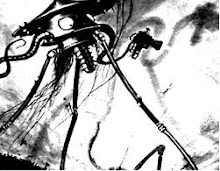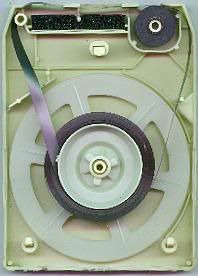Copyright Protected Music Files
Today I had my first experience with a copyright protected digital music file. A little background; I've stayed out of Apple's iPod world -- the idea of my entire music collection on a portable hard drive hasn't seemed very appealing to me (though, I will add that I'd be interested in one for my car, which has an iPod connector built into it, simply because burning CDs gets tiresome.) One, the quality would not be anywhere near my vinyl (128 Kbps? Psh. If I have to go digital, FLAC or bust); two, I rather enjoy the act of sitting down and really listening to music -- there's something about music predominately being the soundtrack to my life that detracts from the music itself; and three, I've always felt that the digital/CD format allows too many shitty artists to put out an album. Let me explain that a bit. I'm not so much worried about the fact that digital music can democratize the production and distribution of music; in fact, I think that that's great. My problem lies with the mainstream music industry -- the one that peddles us one-hit-wonders with shitty filler albums for $20 a pop. It seems that people are more willing to buy a CD than an LP with one good song on it for the simple logistics that it's easier to skip ahead and listen to your favorite song on a CD.
A little more background; I'm currently a part of a music email list that calls itself "The Last Record Store." It's a lot of fun and a great concept -- randomly selected music lovers on the list submit songs to compete against each other once a week. The person who submitted the song with the most votes at the end of the week gets to submit a second song for the next week's competition. So far I've heard some interesting stuff, and I like the exposure to new music.
My first experience with a copyright protected digital file (.m4p and .aac) comes from this week's competition, which also happens to be the same week that I was randomly selected to challenge the current champion (my submission was Wolf Eye's "Stabbed in the Face," from their Burned Mind LP on American Tapes. The champion has pitted me against Delta 5's "Mind Your Own Business." Noise v. Funky Post-Punk. Wooo!)
The champion's song was originally submitted with an .m4p file extension. I had never seen this before, but I assumed that my trusty Winamp would be able to play the file -- no dice. I checked out what program Windows assumed files with that extension were associated with, and I discovered it was iTunes. I installed iTunes and loaded up the file. I was ready to hear some Delta 5 when iTunes informed me that my computer did not have authorization to play the file. What? That seemed rather strange to me, and after some more research I discovered that .m4p and .aac files are digital music files loaded with DRM (Digital Rights Management) software.
My problem with this is that .m4p and .aac files (and by extension, DRM) is problematic for a dying music industry. Throughout my life, most of the music I listen to was first recommended by someone I know, then after hearing some songs I purchased the record. After listening to that, I discovered what music influenced the record I just bought and curiosity spread like a virus. My point here is that someone shared some music with me, and that caused me to go out and discover new music and purchase new records. Many of my friends are the same way, and I suspect that many other people are too. Both .m4p and .aac files put a wrench in that whole process.
With more and more music listeners going digital, and more and more artists allowing their material on DRM files, how can people continue to share the music they love with others? And the efforts of DRM seem fruitless, since it appears to be rather easy to side-step the .m4p file by converting it to a .mp3 file (as the champion was able to do.) The tech savvy among us will be able to get around this, but many others may not. Why shouldn't they be able to easily share the music they love?
Last I checked, making cassette tapes of LPs in the '80s didn't bankrupt the music industry. If anything, that type of sharing increased the size of the listening audience. We wonder why the music industry is tanking -- it seems to me that they are doing it to themselves.
[UPDATE]: Is this the future of media?
[UPDATE 2]: For further reading, this DRM talk is very informative.



No comments:
Post a Comment